 South Africa 17 / 6 Bay of plenty-Thames Valley-Counties
South Africa 17 / 6 Bay of plenty-Thames Valley-Counties
It was the last midweek match of the tour with only the 4th test remaining. The opposition was a combination of 3 relatively weak sides namely Bay of Plenty (who won only 1 of 5 matches played in the 1956 season); Thames Valley (who won only 3 of 8) and Counties (a team founded as South Auckland in 1926 and who won only 2 of 13 season games in 1956). These three teams combined for the first time in 1956 and played 2 warm-up games namely against Auckland (7th of August 1956 losing 6-7) and Waikato (11th of August 1956 losing 6-24) in preparation for the Springboks.
The match was considered on non-contest. A non-event really; within the larger scheme of the 1956 tour. General appreciation was that the Springboks should win without too much trouble. The match, however, elicited a substantial amount of pre and post-match interest due to a number of occurrences. These happenings and occurrences generated far more interest and debate than the fact that South Africa almost lost the match (the score was 6 all ten minutes into the second half).
In the hotel bar Jan Pickard announced after arrival in Rotorua; “if Skinner plays on Tuesday they’ll carry him off on a stretcher.”Soon all New Zealand knew about the threat. New Zealand rugby officialdom went into panic. Cuth Hogg president of the New Zealand rugby Union called Dr Craven; “if what Pickard had said was indeed the intention of the Springboks, then I would have no hesitation in calling the game off.” Craven pacified Hogg. The game went ahead without major incident. The episode did, nonetheless, electrify the build-up for this match and for the deciding 4th test only days away.
The other two incumbent all Blacks that played for the combined team namely Bill Gray (second five-eight) and Pat Walsh (centre) was also a major pre and post-match talking point, from a New Zealand perspective. Their lack of understanding -so far in the season- was a major worry. They looked far from an All Black combination and this worry only increased in intensity after the match. McLean (Battle for the Rugby Crown) explains:
The chief product of the match, from the New Zealand point of view, was an increased anxiety about the suitability of Gray and Walsh as partners in midfield for the fourth test. Neither had a good day defensively, or, for that matter, offensively. Walsh seemed to be grievously hurt in the thigh and because it is customary at this particular time to look for the slightest causes which might lead to the defeat of New Zealand, there were long faces about at the end of the match
Basie Viviers was selected on inside centre (second five-eight) for this match mainly, according to Reg Sweet (The Kiwis Conquer), to have a close-up look at Gray and Walsh. Maxwell Price (Springboks at Bay) relates that this selection created quite a stir among the South African media men on tour. Speculation as to whether that could be a pointer of fourth test team selection in order to bring Dryburg in on fullback was at order. This theory was scoffed upon as it was felt that Kirkpatrick or Howe would be better selections at centre than Viviers. If Viviers was indeed checked out for selection as an inside centre in this match then his performance on the day put a quick end to that line of thought. His lack of speed and uncertainness was one of the reasons why the Springbok backline struggled to fire on the day. Viviers limitations were complicated by injury to Gentles after about 4 minutes. Lochner moved to scrumhalf and his lobbing and erratic service to Ulyate as well as his tendency to go too much on his own (in combination with a cart horse on inside centre) nullified the Springbok backline for most parts of the match.
It was a pity because Tom van Vollenhoven selected for the first time on tour on the right wing (allowing him to step and swerve of his dominant leg) looked dangerous every time he touched the ball. Vollie scored the second last try of the match splitting the opposition apart with a brilliant solo run. He was stopped -soon after- just short of the line after another great piece of individualistic brilliance. Paul Johnstone on the other wing also had a solid game but these two wingers received far too little ball due to very peculiar tactics by Ulyate and Viviers. They kicked almost all the possession down the throat of 19-year old fullback Roddy Oswald; making him look like a future All Black.
The big problem was however again in the tight loose. The match reaffirmed that a mobile pack –even if outplayed in scrums and lineout such as was the case in this match- could leave the 1956 South African team standing.
Eventually 10 Springboks that played in this match were also selected for the fourth test. The set piece (lineout and scrum) was solid enough but the inability of the SA team to play the ball off the ground when on retreat was abundantly clear and not addressed in the selection of the fourth test team. The teams that played in this match can be seen below.
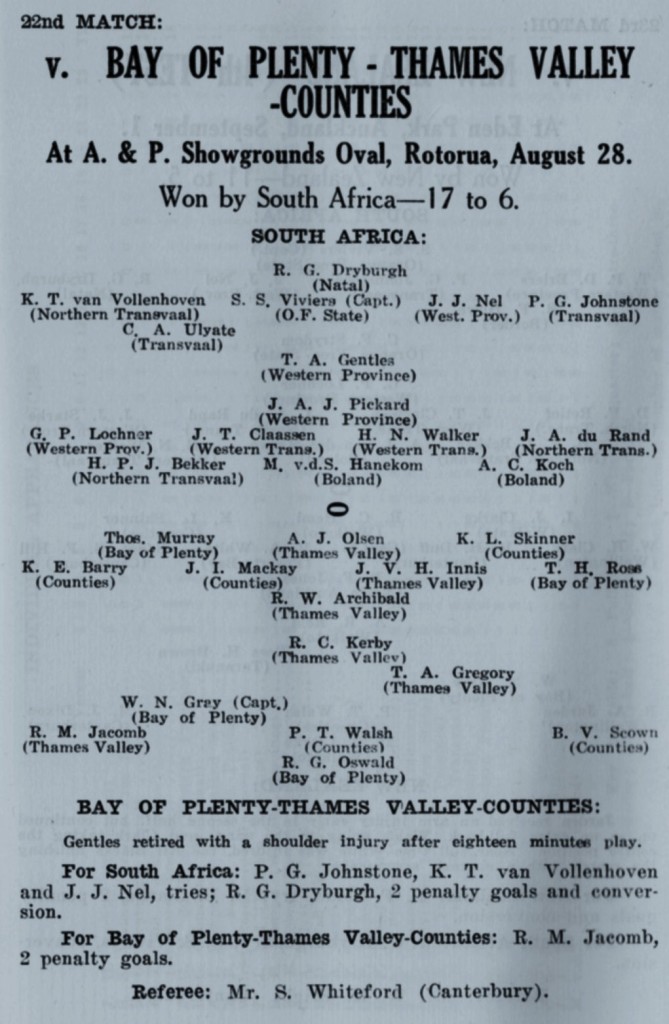
Midway through the second half some positional changes were made and coincidentally the boks started to dominate the game soon thereafter. Jan Pickard moved to the lock position (having started at No8), Chris Koch moved to flank and Harry Newton to the loose head position in the scrum. Koch and du Rand started to turn the tide in the tight loose and Koch in particular had an outstanding game as flanker with du Rand not far behind. There were clearly some clues here on how the Springboks could try and counter the All Black tactics of marauding foot rushes with stab through kicks and/or bursting around the rucks and keeping the ball on the ground in front of the forwards. What was needed was some solid beef that could support the players that pick the ball up and stop the tidal waves with aggressive counter rucking. Du Rand and Koch as loose forwards and Pickard as a lock could have done such a job at least better than the eventual selected Lochner, Retief and Starke.
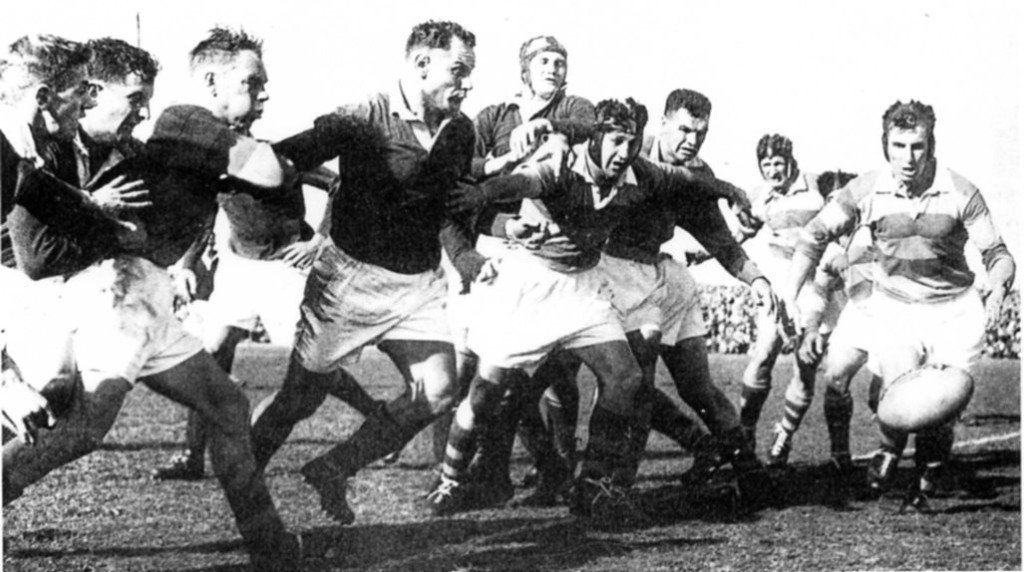
This picture shows Chris Koch in action in the Rotorua match. Koch moved to flank in the second half and had an excellent game.
In addition, a general was required in the number 10 position with the ability to transfer that stabilized ball into set piece ball with astute tactical kicking. Unfortunately, Ulyate tactically kicked himself out of contention for the 4th test side in this match.
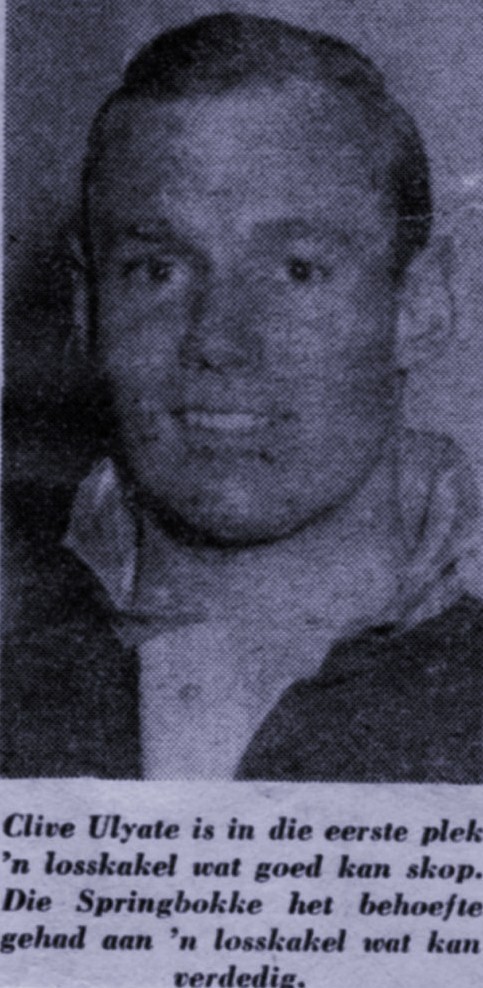
Clive Ulyate was under pressure to maintain his spot as test flyhalf after Bennett Howe’s outstanding performance against the Maori the previous Saturday. The victory against the Maori left Springboks management with the idea that Howe could ignite Craven’s pattern so successful on the 1951/52 tour to the UK. What was really required was a tactical genius able to transfer ruck ball into set piece ball. Unfortunately, Ulyate was severely constricted in his attempt to show case himself in this match due to injury the scrumhalf Gentles early in the game. Ulyate’s defence was also suspect –as the subscript of the photograph above indicates- and his tactical kicking was substandard in this match.
Dryburg on fullback had his usual solid game but was not considered for the fourth test; a mistake that ultimately contributed hugely to New Zealand’s only try in the fourth test.
The game:
Kevin Skinner had a subdued game clearly resting himself for the test match. It was, however, largely due to his efforts and presence that the pack stayed together and played with the spirit they did.
The home team played without their Maori All Blacks halfbacks (Keepa and Whatarau) and their replacements did not do well.
The combined wingers Jacomb and Brown had solid enough games but did not receive much ball.
On the Springbok side Koch, du Rand, Dryburg, Van Vollenhoven and Johnstone were the standout players.
The Springboks started off well in the lineouts but the clean ball so obtained was wasted with poor tactical kicks by Ulyate, Viviers and Johnstone. The home-forwards kept rushing through and applied pressure on the South African halfbacks. Hanekom hooked well (taking 12 tight heads in the game) but with Gentles having left the field after 4 minutes and with the rush through pressure the Springboks could do very little with the ball. Teamwork was lacking in the tight loose and they looked scrappy and unsettled.
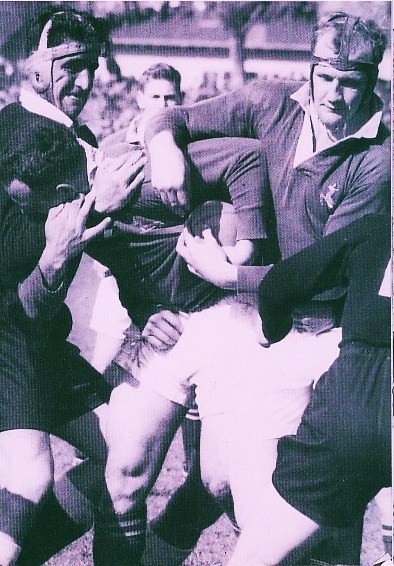
This picture shows Johan Claassen in the lineout. Claassen had his usual good game as lineout man in this match. He was one of few players that came through this tour with his reputation intact.
Oswald missed early on with a drop at goal and Archibald once went over the line but was held up. The first points came eventually after 28 minutes in the first half when Jacomb converted a challenging penalty.
Ulyate at last began to take Lochner’s inconsistent passes, and made a quick break before sending the ball down the backline. Johnstone received on the wing and weaved through the defence for a good try. Dryburg missed with the conversion but succeeded with a penalty 3 minutes before half time to see the Springboks taking a 6-3 lead. Just before half time Van Vollenhoven had his first good run beating his man on the outside but was brought down just before the goal line.
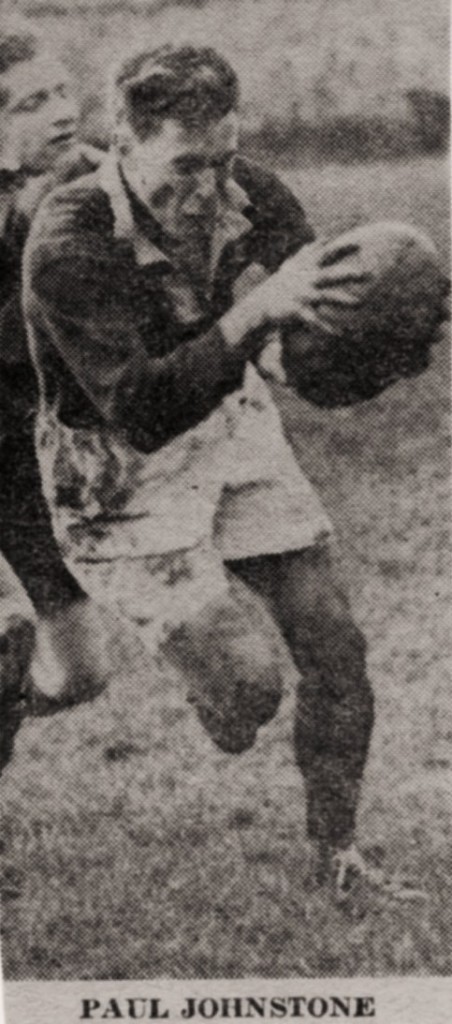
Paul Johnstone was trying hard to regain his test spot after having been dropped for the third test. He scored a good try and was lively throughout the match.
Nine minutes into the second half Hanekom was penalized for foot-up and Jacomb equalled the score. Koch was now on the flank and the Springboks slowly started to get into the game. Ulyate forced an attacking lineout with a long range left foot touch finder. From the scrum that followed the lineout Pickard went over but the referee ruled held-up. The pressure did eventually eventuated into a penalty that Dryburg converted into points.
Hardly a minute later Van Vollenhoven snatched a ball as it came loose from a ruck in the Springboks half. He turned on the burners and outpaced the defence running around his wing and the fullback to score an excellent individualistic try. Seconds later he had another splendid run but was overwhelmed as he tried to cut in at the posts.
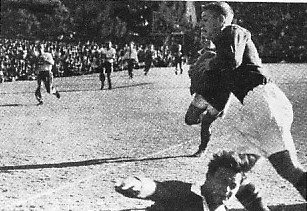
Van Vollenhoven on his way to score one of his 16 tries in 19 matches played on tour.
Lochner broke cleanly and another try went a begging when the support players were penalized for ‘hands in’ at the tackle breakdown. The Springboks maintained attacking pressure and eventually the try came a few minutes before full time. Ulyate fielded a poor clearing kick by Kerby, straightened the line and send the ball to Nel. Going like lightning, writes McLean, Nel threw the most perfect dummy and straightening his run, ran 20 yards or so past Gray and Oswald for a superb try. Dryburg converted to bring the final score to 17-6.
The game produced much food for thought considering the failed experiment with Viviers on centre; the poor tactical kicking of Ulyate; the good performances of Van Vollenhoven on the right wing and Koch on the flank. There was series speculation about the possible test 15 for the deciding 4th test in the media. The selectors also had several meetings during the week to discuss the team, and it seems that they were also not in full agreement on certain positions writes Maxwell Price.
All Black fan on my website wrote he will play 1. Skinner; 2. Fitzpatric and 3. Keith Murdoch in the frontrow everytime they play the Springboks, if he could. What would be you all time best players to play the All Blacks?
My all time Springbok team to play the All Blacks everytime we face them will be:
15. Gysie Pienaar; 14. Ray Mordt; 13. Danie Gerber; 12. Joggie Jansen; 11. Bryan Habana; 10. Bennie Olser; 9. Joost van der Westhuizen; 8. Hennie Muller; 7. Jan Ellis; 6. Piet Greyling; 5. Victor Matfield; 4. Bakkies Botha; 3. Jaap Bekker; 2. Bismarck du Plessis; 1. Os du Randt.
On the reserve bench: 16. Uli Schmidt; 17. Boy Louw; 18. Frik du Preez; 19. Phil Mostert; 20. Henri Honiball; 21. Carel du Plessis; 22. Fourie du Preez.
@ McLook:
appreciate the time and effort you put into these articles Mclook..
enjoy them always..
I did sit for a while to try and pen my AB team but it got harder the more I thought about it.
Zinzan or Buck Shelford or Read? McCaw or the Iceman at 7? Iceman or Kaino at 6? Carter or Fox at 10? Bunce or C.Smith (my current fav AB for years) at 13?
Carl Hayman or Olo Brown? John Kirwan or B.G Williams?
just too hard to do imho
@ nga puhi: I have full appreciation of of your problem. I had to leave players like HO de Villiers, Naas Botha, Burger Geldenhuys, Rob Louw, Hermanus Potgieter, Morne du Plessis, Micheal du Plessis, Gerrie Germishuys, John Gainsford, Ruben Kruger, Andre Venter to name but a few out of my team.
@ nga puhi:
Zinzan , McCaw, the Iceman and Carter would be my choices. But what about Graham Mourie? Hayman and Bryan Wiliams would be my other chioces but that leaves Skinner and/or Murdoch on the sideline. When you play the boks you need to meet fire with fire.
@ McLook:
yep, but then what about guys like Going, Lochore, Don Clarke, Hobbs, Kronfield, Jerry Collins, Walter Little, Tana Umaga, Steven Pokere et al.
guess we must consider ourselves blessed to have so many quality players on both sides
Users Online
Total 228 users including 0 member, 228 guests, 0 bot online
Most users ever online were 3735, on 31 August 2022 @ 6:23 pm